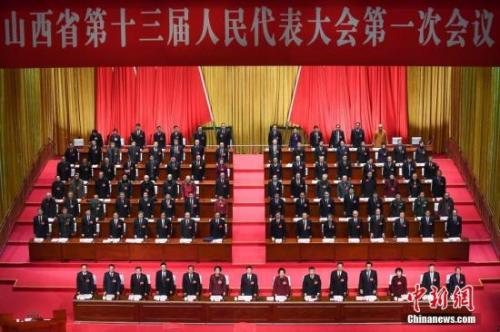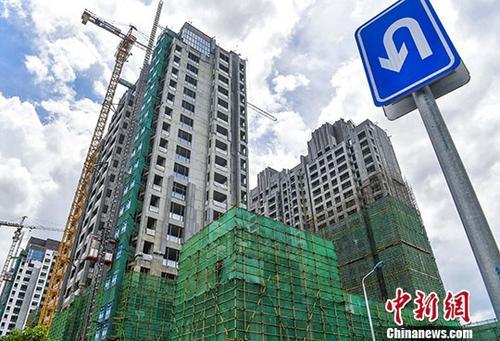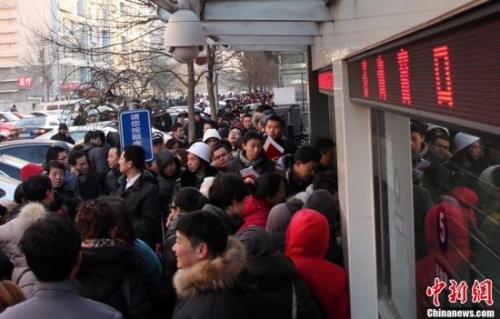BEIJING, Beijing, January 26th (Reporter Zhong Qing) In 2018, two provincial and local conferences are being held intensively. As of January 25th, the government work reports issued by many provinces have focused on the regulation of the property market, and both rent and purchase have become high-frequency words. At the same time, the idea of classified regulation has gradually deepened. Hot cities tend to "stabilize housing prices" and the policy orientation of "destocking" in third-and fourth-tier cities has become clearer.

On January 25th, the first meeting of the 13th People’s Congress of Shanxi Province opened in Taiyuan. China News Service reporter Wu Junjie photo
Living and living in various types of guaranteed housing for the market.
Since the Central Economic Work Conference in 2016 put forward that "houses are for living, not for speculation", ensuring residents to "live and live" has become an important part of deploying the real estate market in various places for two consecutive years, and the supply of various types of affordable housing has obviously accelerated.
According to the statistics of Zhongxin. com reporters, as of January 25th, more than 20 provinces, autonomous regions and municipalities, including Anhui, Xinjiang, Shanghai, Jiangxi, Beijing, Tianjin, Inner Mongolia, Henan, Hunan, Hubei, Gansu, Xizang, Zhejiang, Guangdong, Heilongjiang, Shandong, Shanxi, Yunnan, Guangxi, Hebei and Shaanxi, have held provincial-level local conferences.
In his government work report, Chen Jining, acting mayor of Beijing, pointed out that all the security policies for tenants to live stably and enjoy public services should be implemented, and efforts should be made to promote the construction of 2.9 million square meters of shared property housing and 6 million square meters of commercial housing, raise 50,000 sets of various types of affordable housing, and complete the renovation of 23,600 shanty towns.
Looking back on 2017, Beijing has promoted various types of guaranteed housing such as self-sustaining rental housing, shared property housing, special public rental housing and collective rental housing, and the supply of such housing will accelerate and increase in the future.
Coincidentally, this year, Shanghai will newly supply 493,000 sets of various types of affordable housing; Anhui newly started 281,800 sets of affordable housing projects, and basically completed 237,500 sets; Henan said that it will basically build 340,000 sets of various types of affordable housing; Among the 12 livelihood projects to be done well in Hunan this year, the renovation of urban shanty towns is expected to reach 277,600 sets; Zhejiang will start construction of 292,000 shed-converted resettlement houses and complete 195,000 sets; Hebei started construction of 230,000 new houses this year.
"From the perspective of the construction planning of affordable housing in various places, there may be a wave of construction climax this year, and public rental housing and shed-to-resettlement housing will be actively promoted, especially in the third-and fourth-tier cities, which will enhance the overall construction scale of affordable housing." Yan Yuejin, research director of the think tank center of Yiju Research Institute, told the reporter of Zhongxin.com that the construction of rental housing will be the highlight of the subsequent construction of affordable housing, and the housing supply system of "four products" consisting of commercial housing, affordable housing, shared property housing and rental housing will be more perfect.

Paying attention to both rent and purchase to ensure the rights and interests of tenants
In 2017, the Central Economic Work Conference proposed to speed up the establishment of a housing system with multi-agent supply, multi-channel guarantee and rent-and-purchase. Develop the housing leasing market, especially long-term leasing, and protect the legitimate rights and interests of leasing stakeholders.
For this reason, "rent and purchase simultaneously" has become a high-frequency word in recent provincial conferences.
Ying Yong, mayor of Shanghai, said: speed up the cultivation and development of the housing rental market, and steadily and orderly promote the clean-up and rectification of commercial office projects; Beijing proposes to develop the housing rental market, especially long-term rental, and promote the construction of rental housing with collective construction land; Anhui, on the other hand, focuses on the security of rental housing, requiring the implementation of both physical distribution of public rental housing and rental subsidies; Henan proposed to support Zhengzhou to carry out the pilot project of cultivating and developing the housing rental market and strengthen the security of public rental housing.
"It is expected that during the National People’s Congress in March, discussions on various supporting policies for rental housing will be the focus of public opinion." Zhang Dawei, chief analyst of Zhongyuan Real Estate, said.
According to the statistics of the Central Plains Real Estate Research Center, up to now, more than 10 cities such as Beijing, Foshan, Shanghai, Guangzhou, Shenzhen, Hangzhou and Zhuhai have started the accelerated supply mode of leased land, and the accumulated leased land area nationwide has exceeded 6 million square meters. According to the average single set of 60 square meters, it can directly provide more than 100,000 sets of houses, mainly concentrated in first-and second-tier hot cities.
In Zhang Dawei’s view, to develop the rental market, we should not only "add" the supply, but also "subtract" the rental housing resistance. First of all, it should directly affect the supply of housing and supply leased land with 70-year property rights; At the same time, increase the rights and interests of the lessee and stabilize the lease relationship. Stabilizing the rental market can avoid the ups and downs of the real estate market and reduce the irrational demand for housing.

Data Map: Citizens waiting in line outside the house registration and certification hall in Chaoyang District, Beijing to get their numbers ready for transfer procedures. Photo by Han Haidan
Hot cities, property market regulation is not relaxed, and third-and fourth-tier cities continue to go to inventory.
Stepping into 2018, the pace of property market regulation in various places has not stopped. According to the incomplete statistics of Zhongxin. com reporters, in less than a month, Xiamen, Chengdu, Hefei, Lanzhou and other places have successively issued property market regulation measures; Eleven cities, such as Nanjing, Wuhan, Tianjin and Qingdao, have adjusted their settlement relaxation and talent introduction strategies.
In response to the regulation of the property market, the Central Economic Work Conference stated that it is necessary to distinguish the central and local powers and implement differentiated regulation.
Judging from the two provincial conferences that have been held, the idea of differentiated regulation has been put to the ground, and the first-and second-tier hotspot cities tend to "control housing prices", and the policy orientation of "destocking" in third-and fourth-tier cities has become clearer.
As hot cities in the real estate market, both Beijing and Shanghai have indicated that they should strengthen the regulation of the real estate market.
Chen Jining said that it is necessary to strictly implement various real estate control policies and measures, strengthen market monitoring and policy reserves, and promote the smooth operation of the real estate market; Zhang Guoqing, the acting mayor of Tianjin, stressed stabilizing housing prices, reasonably guiding market expectations and buying houses. At the same time, he strengthened housing credit management, strictly restricted the use of credit funds to invest in speculative buying houses, prevented excessive concentration of credit funds in the real estate sector, and effectively prevented financial risks caused by the real estate bubble.
At the same time, the task of "destocking" continues to advance in some places. Gansu said that it is necessary to keep the cycle of commercial housing decontamination in a reasonable range; Qinghai proposed to do a good job in the key task of "reducing subsidies", vigorously eliminate ineffective supply, vigorously optimize housing supply, and vigorously reduce enterprise costs; Tianjin requires continuous in-depth destocking, revitalizing 3 million square meters of vacant buildings and 1,500 mu of inefficient idle land in demonstration industrial parks.
According to the data of the National Bureau of Statistics, at the end of December 2017, the area of commercial housing for sale nationwide was 589.23 million square meters, down 15.3% from the end of last year, and the inventory level of commercial housing continued to decline.
"Overall, ‘ De-stocking ’ It is nearing the end. " Liu Xiangdong, deputy director of the Economic Research Department of China International Economic Exchange Center, believes that with the in-depth regulation, the inventory of the property market in third-and fourth-tier cities has declined; In first-and second-tier cities, due to measures such as restricting purchases and loans, inventories will gradually be replenished.
Zhang Dawei believes that cities that still need to "destock" will basically relax their household registration policies, attract talents to settle down, and increase the attractiveness of cities; The other is to attract farmers into the city by improving the value of farmers’ homestead. (End)
关于作者